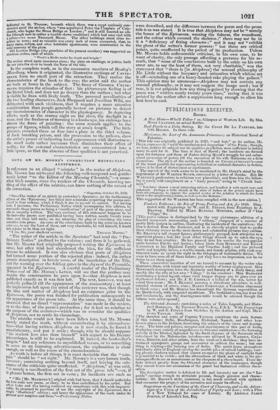ROTE ON MR. MOORE'S CORRECTION RESPECTING ALCIPIIRON.
Is reference to an alleged "mistake" in the notice of A/eiphron, MoonE has addressed the following well-tempered and gentle- manly letter "to the Editor of the Morning Chronicle,"—a some- what Irish course, since the readers of the Chrtmiele, knowing no- thing of the effect of the mistake, can know nothing of the extent of the correction.
" Sloperton, Oatuber 20, 1239. "Sir—The writer of an article in yesterday's Spectator, on the forthcoming cLition of the 'Epicurean,' has fallen into a mistake respecting the poems sub-- ;oined in that volume, which I think it due to myself to correct. Not having 'read, 1 presume, the Preliminary Notice which accompanies this edition, he represents these poems as being a 'versification' of part of the prose story, and rdso as recently written. The very contrary of this statement happens to be The fact—the poems now published baying been written nearly twenty years since, and then laid aside, on my adopting the plan of converting the verse rarrative into prose. As sonic of theconclusions built by the critic. on his own ttror are, to say the least of them, not very charitable, he will himself, I doubt not, rejoice to he thus set right. "I am, Sir, your obedient servant, THOMAS Moonn." "The writer of the article in the Spect«tor" had read the " Pre- liminary Notice" prefixed to the volume; and from it he gathered, that Mr. MoonE had originally proposed writing the Epicurean in verse, but after trial had abandoned the idea, for the sufficient reasons he adduced. It was also obvious that parts of Alciphron bad formed some portion of the rejected plan : indeed, the rather prosaic description, in heroic verse, of the inundation of the Nile, and the warning over the folding gates in the abyss of the Pyramids, appeared in the Epicurean. A careful reader of the Preliminary Notice anti of Mr. Moones Letter, will see that the prate° may require the construction he puts upon it—that ..1/ciphron is now published exactly as it was first left. The text, however, was not perfectly pellucid till the appearance of the commentary ; at least the impression left upon the mind of the reviewer was, that though the idea and matter of Alciphron had an existence prior to the Epicurean, the poem was finished for publication subsequently to the appearance of the prose tale. At the same time, it should be observed that no direct " representation" was made in the review, as to the date of the poem's production ; for it had DO relation to the purpose of the reviewer—which WaS to consider the qualities of iliciphron not to settle its chronology. The mistake would not have been fidlen into, had Mr. MooftE merely stated the truth, without encumbering it by circtunlocu- tion—that having written Akiphron as it now stands, he found it unsatisfactory, and put it aside ; though, why he should suppose "his readers less nice than himself" with regard to his literary miscarriages, is still to be explained. If, indeed, the bookseller's bargain had any reference to unpublished verses, or to something to serve as an imposing advertisement, the explanation is clear enough, as well as the cause of the circumlocution. As truth is before all things, it is most desirable that the " mis- take" should be " set right." Mr. MooftE's is a very barren truth, however ; containing nothing beyond itself, and leaving the sub- stance of the criticism quite unaffected. " Akiphron," as was said, "is merely a versification of the first net of the prose tale"—or, if it pleases better, the first act in verse ; its incidents are such as "Ms [Mr. MacnoNE's] original wish had been, that I should undertake for him some new poem, or story, to be thus embellished hr the artist. But other tasks and ties haring rendered my compliance with this wish impracti- cable, be proposed to purchase of me the copyright of the Epicurean, for a single ' illustrated' edition ; and hence the appearance of the work under its Present new auspices and form."—Pretintinary Notice. were described, and the difference between the poem and the prose tale is as was stated. It is true that Alciphron may not be "merely the bones of the Epicurean, wanting the fulness, the roundness, and the colour which covered the skeleton ;" there may not be in it a "deficiency of fitting character;" and it may not "exhibit the ghost of the writer's former powers:" but these are critical points, quite unaffected by the period of' its production. Unless Mr. Moonn holds unfavourable criticism, in his own case, to be want of charity, the only passage affording a pretence for his re- mark, that "some of the conclusions built by the critic on his own error are, to say the least of them, not very charitable," was the statement that "there is [in Alchron] the sensual philosophy of Mr. Little without the buoyancy and animation which whit= set it off—reminding one of a hoary-headed rake playing the gallant." This opinion may be erroneous—Akipkron may not contain any sensual philosophy, or it may not suggest the image used ; but if true, it is not palpable how any thing is gained by showing that the poem was "written nearly twenty years since," seeing that it was printed by the author after a suppression long enough to allow his first love to cool.


























 Previous page
Previous page